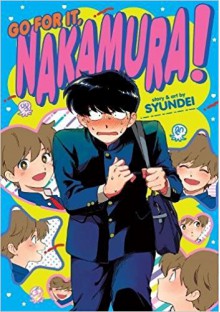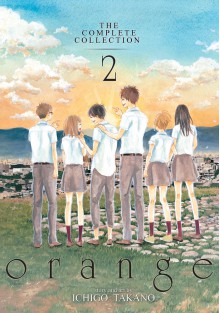
Machi is tired of her parents' constant efforts to match her up with a successful man and half jokingly says she should marry someone they'd hate just to spite them. Her friend Hana surprises her when she suggests that the two of them get married. The news so shocks Machi's parents that they do indeed back off, at least temporarily. The special partnership certificate requires that they both live in Shibuya, so Hana moves in with Machi, which also helps them maintain the marriage charade.
Machi can't help but wonder if Hana is actually serious about all of this, though. Back in high school, Hana confessed her love for her, and Machi turned her down. They've continued to be friends, but what if Hana hopes their fake marriage will become a real one? As Machi starts to ponder her and Hana's relationship, she also takes a long, hard look at her life.
This was okay. I wanted something light and non-explicit, and that's what I got. I kind of wished it had a bit more substance to it, though. Machi seemed to just work, eat, and sleep, which fit her characterization, but I would have thought Hana would have had a more visible social life beyond the one meet-up with her ex.
Hana was the energetic and positive one, while Machi spent a large chunk of the volume looking tired and depressed. I was glad when Machi started evaluating her life and deliberately became a more active participant in it. I cheered her on when she became more assertive at work, and the part where she told her mother off for the first time was great. She was standing up for Hana, yes, but also for herself.
I had some issues with the romance aspect, mostly due to the fact that Hana and Machi's expectations for what their marriage would be like once it went from being fake to real didn't seem to match up (although the special partnership certificate was real, so honestly they were married for real from the start, but whatever). Machi seemed perfectly fine with the way things were - living together, spending time together, making meals for each other, and just generally supporting each other, no sex required.
There's no problem with that, and I actually would have been on board with it, if it hadn't been so obvious that Hana expected their relationship to eventually include sex. She made it clear that she was willing to wait and take things slow, but it never seemed to enter her mind that it might never happen, or that it might happen but that Machi might not be as into it as she was. There were no moments when Machi realized she found Hana sexually attractive, and all physical affection, except for a few head pats and a hug, were initiated by Hana. But they did eventually kiss and Machi enjoyed it, so maybe I was concerned for no reason.
Overall, this was nice, but it could have used a second volume. Or a full volume devoted to this story and these characters. It's common for one-shots to include one or more additional stories, and this one was no exception. The last quarter or so was devoted to an unrelated short called "Anaerobic Love."
If you were flipping through the volume, you'd likely think it was a flashback to Machi and Hana's high school days, because the character designs are so similar, but the story actually stars Oshimi and Mutsumi. Mutsumi is the school's track star, while Oshimi used to be in track but hurt herself and now dedicates herself to studying. Mutsumi seems cold towards Oshimi, and yet she frequently has Oshimi give her massages after practice. Oshimi, for her part, eventually realizes that her interest in Mutsumi may actually be love.
I liked this story a good deal less than the main one, and the times when Oshimi deliberately hurt Mutsumi while massaging her made me uncomfortable. I'd really have preferred it if this story had been scrapped and the main one fleshed out a bit more.
Extras:
A color illustration, a 2-page author afterword in manga form, and four pages worth of extra scenes relating to the main story.
Rating Note:
I debated between 3 and 3.5 stars. It wasn't the most memorable thing ever, and I doubt I'll ever want to reread it, but I did really enjoy Machi's personal growth, so I went with 3.5.
(Original review posted on A Library Girl's Familiar Diversions.)

 Log in with Facebook
Log in with Facebook 








